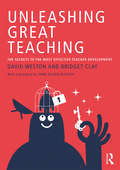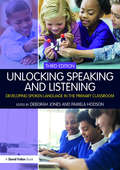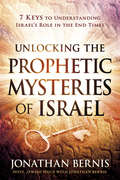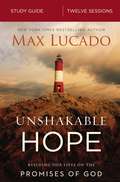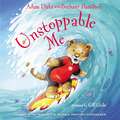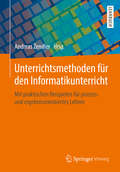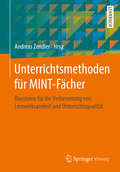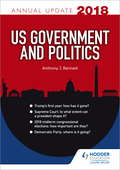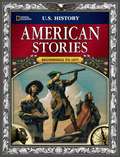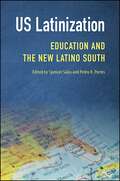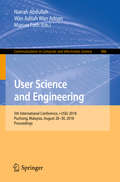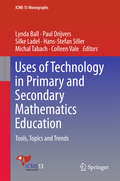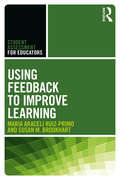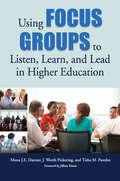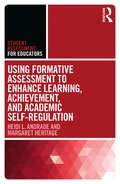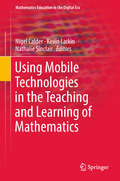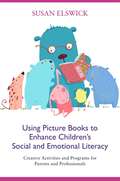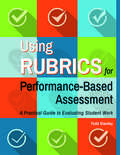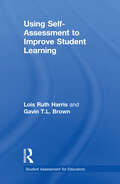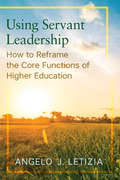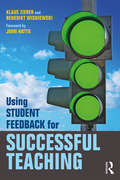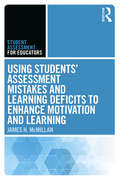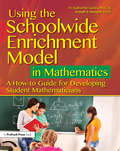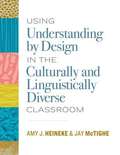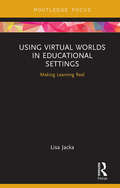- Table View
- List View
Unleashing Great Teaching: The Secrets to the Most Effective Teacher Development
by David Weston Bridget ClayIt’s within the power of each and every school to unleash the best in teachers, day by day, month by month, year by year. This practical handbook takes the guesswork out of professional learning, showing school leaders how they can build a self-improving culture and remove barriers to learning. David Weston and Bridget Clay set out their advice for how every school can bring in the best ideas from the whole system, and make sure that these have a lasting effect in the classroom. Packed full of examples, easy-to-use ideas and checklists, Unleashing Great Teaching brings together a vast body of experience gained by the Teacher Development Trust (UK), and shows how other schools can learn from these insights. From fostering a culture of evaluating impact to establishing good relationships, communication and a developmental culture, this book takes each and every aspect of the school system and reassesses its role as a driver of teacher and student success. An invaluable resource for leaders at any level within the schooling system, Unleashing Great Teaching will open doors and inspire leaders, teachers, students and communities to learn about learning.
Unlocking Speaking and Listening: Developing Spoken Language in the Primary Classroom (Unlocking Series)
by Deborah Jones Pamela HodsonSpoken Language is a key component of the primary national curriculum and is fundamental to children’s language development and learning. The need for teachers to develop talk in its own right and also use talk as a means of learning is central to effective primary practice. In the past, Initial Teacher Education and CPD have focused on literacy (reading and writing) to the detriment of speaking and listening. However, research strongly supports talk as fundamental to learning and teaching. It has also been identified as an area where teachers feel less confident. This fully updated third edition of Unlocking Speaking and Listening tackles key issues surrounding spoken language with rigour, depth and a strong focus on research, providing education professionals with clear, practical strategies for engaging in purposeful talk, while also celebrating children’s implicit understanding and love of the spoken word. Drawing on recent classroom research, Unlocking Speaking and Listening considers what children and teachers need to know in order to develop as effective speakers and listeners. The book addresses: Planning and assessing talk Drama and storytelling Working with EAL children Developing talk in Science and Mathematics Special educational needs Using technology to enhance children’s communication Two new chapters on the importance of talk to underpin children’s reading development are also included. With contributions from experts in the field, this vital and fully updated resource will help both trainee and practising primary teachers understand and promote the importance of speaking and listening as an effective tool for learning across the primary curriculum.
Unlocking the Prophetic Mysteries of Israel: 7 Keys to Understanding Israel's Role in the End-Times
by Jonathan BernisWe are witnessing things today that the prophets of Israel longed to see. God is fulfilling His Word in our generation! If you want to understand what God is doing in these last days, you must understand what He is doing with Israel. It is here that the Bible&’s prophecies regarding the end of the age will all unfold. Jonathan Bernis, host of the internationally popular television program Jewish Voice With Jonathan Bernis, with this fascinating book unlocks a greater knowledge about the last days. The book explores questions such as: What crucial role does Israel play in the last days?Why is anti-Semitism on the rise worldwide, and what is at its root?What is the seed promise, and why is Satan so angry about it?What profound promise did God make to Abraham that applies to you today?
Unshakable Hope Study Guide: Building Our Lives on the Promises of God
by Max LucadoThis 12-session video Bible study will help you, your group, and your church stand on the definitive declarations of our mighty and loving God who governs the world according to his great and precious promises.This world has a tremble to it. There are things that seem unsteady in this life. But when we belong to God, it allows us to filter our problems through the promises of God. When we choose to be people of the promise, we choose to build our lives on the promises of God, not the circumstances of life.The stories of the men and women in Scripture were different, but the theme was the same: they were People of the Promise. Because of God’s promises, Noah built an ark on dry land, Joshua claimed the Promised Land, David became king, Peter preached the first sermon, and John caught a glimpse of the future. Like them, we can also build our lives on God’s promises, and trust him to keep them.This study guide includes tools for personal study and reflection, video notes, and questions for group discussion.Sessions include:You Are Stamped with God’s ImageGod Will Win the VictoryYou Are an Heir of GodYour Prayers Have PowerGod Gives Grace to the HumbleGod Gets YouJesus Is Praying for YouDeath Has Been DefeatedJoy Is Coming SoonYou Will Have PowerThere Is No Condemnation in ChristJustice Will PrevailDesigned for use with the Unshakable Hope Video Study (9780310092117), sold separately.
Unstoppable Me
by Adam DirksUnstoppable Me, written by New York Times bestselling author and champion surfer Bethany Hamilton with husband, Adam Dirks, tells the story of Makana the lion, who loves to surf but loses her nerve when she wipes out. When her friend encourages her to go back out again, Makana summons up the courage and discovers the success that comes from believing in yourself and never giving up.As seen in the feature film Bethany Hamilton: Unstoppable, this playful book will have little ones cheering for Makana and inspire them to stay strong and keep trying, no matter what challenges might come their way.
Unterrichtsmethoden für den Informatikunterricht
by Andreas ZendlerZu den meisten Unterrichtsfächern findet man heute umfangreiche Standardwerke zum Thema Unterrichtsmethoden, nur für das Fach Informatik existiert keine vergleichbare Literatur. Dabei zeigt ein Blick auf die Bildungspläne aller Bundesländer, dass sich die Informatik als Unterrichtsfach in den Sekundarstufen I und II etablieren wird. Das vorliegende Buch versteht sich als ein Beitrag zur Schließung dieser Lücke in der Informatikdidaktik. Unterrichtsmethoden sind für den Lernerfolg im Unterricht von entscheidender Bedeutung und bilden auch den Dreh- und Angelpunkt dieses Buches. Unterrichtsmethode wird verstanden als klar umrissener, begrifflich herauslösbarer, selbstständiger, wenn auch integrierter Bestandteil des Unterrichts. Als Beispiele für dieses Verständnis von Unterrichtsmethoden werden unter anderem die Vor- und Nachteile des problemorientierten Unterrichts, des entdeckenden Lernens, der Computersimulation, des Frontalunterrichts und der Modellmethode für die Informatikdidaktik erläutert. So entsteht ein Überblick über 20 verschiedene und für den Informatikunterricht relevante Methoden, die anhand von Vorgehensmodellen und konkreten Beispielen für den Einsatz im Unterricht illustriert werden. Außerdem haben Informatiklehrer die verschiedenen Methoden in Hinblick auf ihre Lerneffektivität eingeschätzt. Die Grundlage für dieses erste Übersichtswerk zu Unterrichtsmethoden für den Informatikunterricht bilden verschiedene Forschungsprojekte der Pädagogischen Hochschule Ludwigsburg, die zwischen 2015 und 2018 Daten zu diesem Thema gesammelt haben. Auch dieses wissenschaftliche Fundament macht das Buch zu einer unbedingten Empfehlung für alle (angehenden) Informatiklehrer, die schon lange nach einem Titel mit Unterrichtsmaterialien für den Informatikunterricht gesucht haben.
Unterrichtsmethoden für MINT-Fächer
by Andreas ZendlerMathematik, Informatik, Naturwissenschaften (Biologie, Chemie, Physik) und Technik - seit Jahren findet in der breiten Öffentlichkeit eine angeregte Diskussion über diese sogenannten MINT-Fächer statt. Denn das in den MINT-Fächern vermittelte Wissen ist die unverzichtbare Grundlage für die Ausbildung der in Deutschland dringend benötigten Fachkräfte. Darum fordern Politik und Wirtschaft eine stärkere Gewichtung der Fächer, aber auch eine Verbesserung der Unterrichtsqualität. Dieses Buch stellt 20 verschiedene, wissenschaftlich fundierte Methoden für den MINT-Unterricht vor und erläutert die Rolle der digitalen Medien als fächerübergreifendes Element. Die interdisziplinäre Betrachtungsweise bietet Lehrern einen umfassenden Überblick über die verschiedenen Möglichkeiten und Ansätze für den eigenen Unterricht. Für jede der vorgestellten Methoden geben die Autoren wissenschaftliche fundierte Einschätzungen zu ihrer Lerneffektivität und erleichtern so Lehrkräften die Auswahl der geeignetsten Methoden für den eigenen Unterricht. Detaillierte Unterrichtsmodelle helfen bei der Umsetzung in der Praxis. Damit erhalten Lehrer und Lehramtsstudenten einen umfassenden Einblick in die effektivsten Unterrichtsmodelle für ein prozess- und ergebnisorientiertes Lernen in den MINT-Fächern. Dieses Buch lässt sich ideal fächerübergreifend einsetzen und dient dazu, die Lerneffektivität speziell im MINT-Unterricht bei Schülerinnen und Schülern zu verbessern.
US Government & Politics Annual Update 2018
by Anthony J BennettTopical reading essential for exam success.- Review all the key developments in US politics from the last year, with expert analysis you can draw on both throughout your course and in the exams- Go beyond your textbooks to build a bank of up-to-date examples and data, helping you develop knowledgeable and persuasive arguments- Know how to hit the highest grades with guidance from experienced teacher and author, Anthony J. BennettContentsChapter 1: The Trump cabinetChapter 2: To what extent can a President reshape the Supreme Court?Chapter 3: The Supreme Court: the 2016/2017 termChapter 4: The Gorsuch nomination to the Supreme CourtChapter 5: More from the 2016 electionsChapter 6: The 2018 midterm congressional electionsChapter 7: Where's the Democratic Party going?Chapter 8: Presidential pardonsChapter 9: An assessment of Trump's first year
US History: American Stories, Beginnings to 1877
by National Geographic StaffThe history of the United States is a chronicle of different regions that today are pulled together on a cultural basis. In the early years, our identity as a nation was defined on a military or political basis-- and we're still struggling with those differences.
US Latinization: Education and the New Latino South
by Spencer Salas; Pedro R. PortesOffering a much-needed dialogue about Latino demographic change in the United States and its intersections with P–20 education, US Latinization provides discussions that help move beyond the outdated idea that Mexican and Spanish (language) are synonyms. This nativist logic has caused "Mexican rooms" to re-emerge in the form of English to Speakers of Other Languages (ESOL) transitional programs, tagging Latinos as "Limited English Proficient" in ways that contribute to persisting educational gaps. Spencer Salas and Petro R. Portes bring together voices that address the social and geographical nature of achievement and that serve as a theoretical or methodological resource for educational leaders and policy makers committed to access, equity, and educational excellence.
User Science and Engineering: 5th International Conference, i-USEr 2018, Puchong, Malaysia, August 28–30, 2018, Proceedings (Communications in Computer and Information Science #886)
by Natrah Abdullah Wan Adilah Wan Adnan Marcus FothThis book constitutes the refereed proceedings of the 5th International Conference on User Science and Engineering, i-USEr 2018, held in Puchong, Malaysia, in August 2018. The 32 papers accepted for i-USEr 2018 were selected from 72 submissions with a thorough double-blind review process. The selected papers illustrate how HCI is inclusive and omnipresent within the domains of informatics, Internet of Things, Quality of Life, and others. They are organized in the following topical sections: design, UX and usability; HCI and underserved; technology and adoption; human centered computing; HCI and IT infrastructure; and HCI and analytics.
Uses of Technology in Primary and Secondary Mathematics Education: Tools, Topics And Trends (ICME-13 Monographs)
by Paul Drijvers Lynda Ball Hans-Stefan Siller Silke Ladel Michal Tabach Colleen ValeThis book provides international perspectives on the use of digital technologies in primary, lower secondary and upper secondary school mathematics. It gathers contributions by the members of three topic study groups from the 13th International Congress on Mathematical Education and covers a range of themes that will appeal to researchers and practitioners alike. The chapters include studies on technologies such as virtual manipulatives, apps, custom-built assessment tools, dynamic geometry, computer algebra systems and communication tools. Chiefly focusing on teaching and learning mathematics, the book also includes two chapters that address the evidence for technologies’ effects on school mathematics. The diverse technologies considered provide a broad overview of the potential that digital solutions hold in connection with teaching and learning. The chapters provide both a snapshot of the status quo of technologies in school mathematics, and outline how they might impact school mathematics ten to twenty years from now.
Using Feedback to Improve Learning (Student Assessment for Educators)
by Maria Araceli Ruiz-Primo Susan M. BrookhartDespite feedback‘s demonstratively positive effects on student performance, research on the specific components of successful feedback practice is in short supply. In Using Feedback to Improve Learning, Ruiz-Primo and Brookhart offer critical characteristics of feedback strategies to affirm classroom feedback’s positive effect on student learning. The book provides pre- and in-service teachers as well as educational researchers with empirically supported techniques for using feedback as a part of formative assessment in the classroom.
Using Focus Groups to Listen, Learn, and Lead in Higher Education
by Mona J.E. Danner J. Worth Pickering Tisha M. ParedesUsing Focus Groups to Listen, Learn, and Lead in Higher Education presents an easy-to-use 6-step guide to help leaders in higher education listen to and learn from their stakeholders in order to enhance decision making. The big questions facing institutions today--especially those surrounding access, affordability, and accountability--require more than dashboards. Metrics and quantitative data alone do not offer lasting solutions and improvements. Using qualitative methods to listen to the voices of those involved, especially students and staff, is critical. Focus groups constitute the most appropriate, rigorous, and relevant qualitative research tool for this purpose, and one that is cost-effective and builds community when conducted using the ODU Method described in this book. Using Focus Groups is a single, comprehensive, and practical resource that describes why, when, and how to use focus groups. The authors provide detailed guidance for using focus groups, from developing the research questions with stakeholders, through training and recruiting moderators, and identifying and recruiting participants, to the logistics of conducting focus groups, and ultimately analyzing data and developing final reports. Conversational vignettes illustrate the discussions that regularly occur in each step and help the reader better understand the process. Fifteen appendices provide templates and examples of every part of the process.Written particularly for institutional research and assessment staff and upper-level administrators, this book will also appeal to deans, department and program chairs and directors, faculty leaders, and administrative unit directors, including those in auxiliary and student services, alumni associations, and university foundations. It also serves as an excellent resource for higher education research methods courses.The authors are uniquely positioned to guide readers in this process. The team developed and refined this technique over two decades at Old Dominion University. They have conducted over 100 focus groups with campus, nonprofit, local, and international community organizations to assist them in assessing student learning, transition, and preparedness for the workforce, as well as evaluating organizations work and planning future projects.
Using Formative Assessment to Enhance Learning, Achievement, and Academic Self-Regulation (Student Assessment for Educators)
by Heidi L. Andrade Margaret HeritageThere is convincing evidence that carefully applied classroom assessments can promote student learning and academic self-regulation. These assessments include, but are not limited to, conversations with students, diagnostic test items, and co-created rubrics used to guide feedback for students themselves and their peers. Writing with the practical constraints of teaching in mind, Andrade and Heritage present a concise resource to help pre- and in-service teachers maximize the positive impacts of classroom assessment on teaching. Using Formative Assessment to Enhance Learning, Achievement, and Academic Self-Regulation translates work from leading specialists and explains how to use assessment to improve learning by linking learning theory to formative assessment processes. Sections on goal setting, progress monitoring, interpreting feedback, and revision of goal setting make this a timely addition to assessment courses.
Using Mobile Technologies in the Teaching and Learning of Mathematics (Mathematics Education in the Digital Era #12)
by Nigel Calder Kevin Larkin Nathalie SinclairMobile technologies influence the way that we interact with the world, the way that we live. We use them for communication, entertainment, information and research. In education settings, there has been substantial investment in mobile devices, often without a concomitant investment in developing pedagogy and practices. With mobile technologies evolving rapidly, and the number of educational apps growing, there is a need for research into how they facilitate mathematics learning. Such research is of particular importance regarding how such devices may be used to open up new ways of envisaging mathematics and mathematics education, and to help develop conceptual rather than procedural or declarative knowledge. This volume draws upon international research and reports on a range of research projects that have incorporated mobile technologies for mathematics education. It presents research on the use of mobile technologies, such as iPads, iPods, iPhones, Androids, and Tablets, across a diverse range of cultures, year levels and contexts. It examines the ways in which mobile technologies, including apps, might influence students’ engagement, cognition, collaboration and attitudes, through the reshaping of the learning experience. In addition, the book presents appropriate ways to integrate mobile technologies into teaching and learning programmes. It is a significant reference book for those involved with teaching mathematics or using mobile technologies in education, while also offering insights and examples that are applicable to the use of digital technologies in education generally.
Using Picture Books to Enhance Children’s Social and Emotional Literacy: Creative Activities and Programs for Parents and Professionals
by Susan ElswickChildren can struggle to engage with and articulate certain emotions, which can have a profound impact on their behaviour, confidence and ability to form relationships, follow instructions and perform tasks. This resource for teachers, therapists, counsellors and parents uses children's literature and some of its well-known characters, such as the Rainbow Fish and Stanley Yelnats IV from Holes, as a basis for practical activities that enable children to express and manage these emotions. Social-emotional literacy training assists students in developing important life skills such as the ability to develop good relationships and empathy skills, as well as being able to understand, manage and communicate their own emotions. This book offers an introduction to social-emotional literacy, followed by activities related to emotions such as empathy, friendship, grief and self-esteem, aiming to embed this literacy training into daily school and home activities to increase children's chances of future success.
Using Rubrics for Performance-Based Assessment: A Practical Guide to Evaluating Student Work
by Todd StanleyWriting a rubric that can accurately evaluate student work can be tricky. Rather than a single right or wrong answer, rubrics leave room for interpretation and thus subjectivity. How does a teacher who wants to use performance-based assessment in this day and age of SMART goals find a way to reliably assess student work? The solution is to write clear rubrics that allow the evaluator to objectively assess the student work. This book will show classroom teachers not only how to create their own objective rubrics, which can be used to evaluate performance assessments, but also how to empower their own students to create rubrics that are tailored to their work.
Using Self-Assessment to Improve Student Learning (Student Assessment for Educators)
by Lois Ruth Harris Gavin T.L. BrownUsing Self-Assessment to Improve Student Learning synthesizes research on self-assessment and translates it into actionable guidelines and principles for pre-service and in-service teachers and for school leaders, teacher educators, and researchers. Situated beyond the simple how-to frameworks currently available for teachers and graduate students, this volume illuminates self-assessment’s complexities and substantial promise to strategically move students toward self-regulated learning and internalized goals. Addressing theory, empirical evidence, and common implementation issues, the book’s developmental approach to quality self-assessment practices will help teachers, leaders, and scholars maximize their impact on student self-regulation and learning.
Using Servant Leadership: How to Reframe the Core Functions of Higher Education
by Angelo J. LetiziaUsing Servant Leadership provides an instructive guide for how faculty members can engage in servant leadership with administrators, students, and community members. By utilizing a wide range of research and through a series of case studies, Angelo J. Letizia demonstrates how, with a bit of creative thinking, the ideals of servant leadership can work even in the fractious, cash-strapped world of contemporary higher education. Furthermore, he considers how these concepts can be implemented in pedagogy, research, strategic planning, accountability, and assessment. This book points the way to a more humane university, one that truly serves the public good.
Using Student Feedback for Successful Teaching
by Klaus Zierer Benedikt WisniewskiFeedback from students to teachers has been shown to have a major influence on students’ achievement. Although the use of feedback from students requires little time and investment, the exploration of this topic in recent years has focused primarily on that from teacher-to-student or teacher-to-teacher. This innovative book examines the much-neglected feedback path from student to teacher and provides an empirically founded and practice-oriented step-by-step guide for teachers who want to get feedback on their own teaching. Including a foreword by John Hattie, the authors shed light on the benefits, challenges, impact and academic discussion of student feedback. Topics include: an outline of the current state of research about feedback, including in the light of Visible Learning, and the essentials for translating this research into implementation in the classroom; the advantages of student-to-teacher feedback and how it is connected to good, effective teaching; the practicalities of putting student feedback into practice: finding the right questions to ask, professional discussion, and how to go about applying changes to your teaching; an exploration of combining digital technologies with the acquisition and evaluation of student feedback; the wider impact of feedback and how a "feedback culture" can transform not only individual teachers but whole schools. Using Student Feedback for Successful Teaching is an essential guide for experienced and newly-qualified teachers alike who are invested in their professional development and who strive to deliver the best quality teaching for their students.
Using Students' Assessment Mistakes and Learning Deficits to Enhance Motivation and Learning (Student Assessment for Educators)
by James H. McMillanBeing wrong is an integral part of the assessment process, and understanding how to learn from those mistakes, errors, and misconceptions helps educators and students get the most from their learning experience. In this practical volume, James H. McMillan shows why being wrong (sometimes) is an essential part of effective learning and how it can be used by teachers to motivate students and help develop positive achievement-related dispositions. The six concise chapters of Using Students’ Assessment Mistakes and Learning Deficits to Enhance Motivation and Learning show how mistakes affect students’ engagement, self-regulation, and knowledge, and how teachers can most effectively contextualize supposed failures to help students grow.
Using the Schoolwide Enrichment Model in Mathematics: A How-To Guide for Developing Student Mathematicians
by M. Katherine Gavin Joseph S. RenzulliUsing the Schoolwide Enrichment Model in Mathematics: A How-to Guide for Developing Student Mathematicians applies the teaching and learning strategies of the Schoolwide Enrichment Model (SEM) to the math classroom. Based on more than 40 years of research and development and used in schools around the world, the SEM approach focuses on promoting higher level thinking skills and creative productivity. Using this approach in mathematics, this new guidebook promotes the use of the Mathematical Practices outlined in the Common Core State Standards as the underlying processes and proficiencies that should be developed in students. Teachers learn how to create a culture of enjoyment, engagement, and enthusiasm for all students, and in particular gifted students, while developing students who think and act like mathematicians. Easy to read and use, the book incorporates many practical suggestions, including views from the classroom and sample activities from NAGC-award winning curriculum to motivate and challenge students.
Using Understanding by Design: In The Culturally and Linguistically Diverse Classroom
by Amy J. Heineke; Jay McTigheHow can today's teachers, whose classrooms are more culturally and linguistically diverse than ever before, ensure that their students achieve at high levels? How can they design units and lessons that support English learners in language development and content learning—simultaneously? Authors Amy Heineke and Jay McTighe provide the answers by adding a lens on language to the widely used Understanding by Design® framework (UbD® framework) for curriculum design, which emphasizes teaching for understanding, not rote memorization. <p><p> Student profiles, real-life classroom scenarios, and sample units and lessons provide compelling examples of how teachers in all grade levels and content areas use the UbD framework in their culturally and linguistically diverse classrooms. Combining these practical examples with findings from an extensive research base, the authors deliver a useful and authoritative guide for reaching the overarching goal: ensuring that all students have equitable access to high-quality curriculum and instruction.
Using Virtual Worlds in Educational Settings: Making Learning Real
by Lisa JackaThe building of communities outside of the traditional brick-and-mortar base of a school or university is at a significant point in time; virtual worlds bridge the gap between 2D web spaces online and 3D physical spaces of the classroom, providing teachers and students alike with opportunities to connect and collaborate in ways that were previously unimaginable. Providing insight into this new age of teaching, Using Virtual Worlds in Educational Settings presents a collection of practical, evidence-based ideas that illustrate the capacity for immersive virtual worlds to be integrated successfully in higher education and school settings. Examining research and stories from more than 1,000 students and six faculty members who introduced virtual worlds into their teaching and learning, this book contains practical examples of how virtual worlds can be introduced and supported, as well as reflections from faculty and students about their response to virtual worlds. This research will help teachers understand how to approach such a fundamental shift in pedagogy, how to liberate themselves from teacher-focused instruction and how to help students to develop their skills through collaboration. Outlining how and why virtual worlds could be the shift in pedagogy that teachers have been waiting for, Using Virtual Worlds in Educational Settings is an accessible, practical resource for educators to support their use of virtual worlds in teaching.
